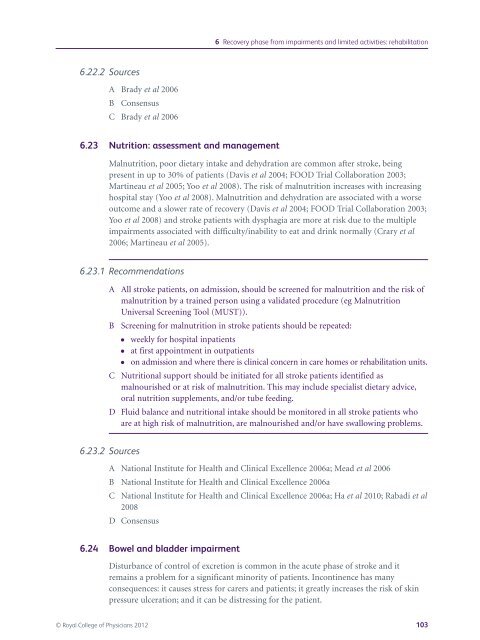national-clinical-guidelines-for-stroke-fourth-edition
national-clinical-guidelines-for-stroke-fourth-edition
national-clinical-guidelines-for-stroke-fourth-edition
You also want an ePaper? Increase the reach of your titles
YUMPU automatically turns print PDFs into web optimized ePapers that Google loves.
6.22.2 Sources<br />
A Brady et al 2006<br />
B Consensus<br />
C Brady et al 2006<br />
6.23 Nutrition: assessment and management<br />
Malnutrition, poor dietary intake and dehydration are common after <strong>stroke</strong>, being<br />
present in up to 30% of patients (Davis et al 2004; FOOD Trial Collaboration 2003;<br />
Martineau et al 2005; Yoo et al 2008). The risk of malnutrition increases with increasing<br />
hospital stay (Yoo et al 2008). Malnutrition and dehydration are associated with a worse<br />
outcome and a slower rate of recovery (Davis et al 2004; FOOD Trial Collaboration 2003;<br />
Yoo et al 2008) and <strong>stroke</strong> patients with dysphagia are more at risk due to the multiple<br />
impairments associated with difficulty/inability to eat and drink normally (Crary et al<br />
2006; Martineau et al 2005).<br />
6.23.1 Recommendations<br />
A All <strong>stroke</strong> patients, on admission, should be screened <strong>for</strong> malnutrition and the risk of<br />
malnutrition by a trained person using a validated procedure (eg Malnutrition<br />
Universal Screening Tool (MUST)).<br />
B Screening <strong>for</strong> malnutrition in <strong>stroke</strong> patients should be repeated:<br />
● weekly <strong>for</strong> hospital inpatients<br />
● at first appointment in outpatients<br />
● on admission and where there is <strong>clinical</strong> concern in care homes or rehabilitation units.<br />
C Nutritional support should be initiated <strong>for</strong> all <strong>stroke</strong> patients identified as<br />
malnourished or at risk of malnutrition. This may include specialist dietary advice,<br />
oral nutrition supplements, and/or tube feeding.<br />
D Fluid balance and nutritional intake should be monitored in all <strong>stroke</strong> patients who<br />
are at high risk of malnutrition, are malnourished and/or have swallowing problems.<br />
6.23.2 Sources<br />
A National Institute <strong>for</strong> Health and Clinical Excellence 2006a; Mead et al 2006<br />
B National Institute <strong>for</strong> Health and Clinical Excellence 2006a<br />
C National Institute <strong>for</strong> Health and Clinical Excellence 2006a; Ha et al 2010; Rabadi et al<br />
2008<br />
D Consensus<br />
6.24 Bowel and bladder impairment<br />
6 Recovery phase from impairments and limited activities: rehabilitation<br />
Disturbance of control of excretion is common in the acute phase of <strong>stroke</strong> and it<br />
remains a problem <strong>for</strong> a significant minority of patients. Incontinence has many<br />
consequences: it causes stress <strong>for</strong> carers and patients; it greatly increases the risk of skin<br />
pressure ulceration; and it can be distressing <strong>for</strong> the patient.<br />
© Royal College of Physicians 2012 103


